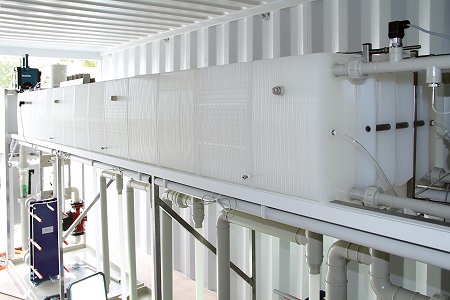
Following the installation of one of its units in the Maldives, German thermal desalination provider memsys claimed it has developed “energy positive desalination”, suggesting the technology can actually generate operators a net saving for every cubic metre of water produced in combination with generators.
The 10 m3/day installation was installed on the remote island of Gulhi and the desalination process is based on vacuum multi-effect membrane distillation (V-MEMD), a thermal process based on thermal separations in a modular concept.
Speaking to WWi magazine, Florian Bollen, director of the German/Singaporean company memsys, who´s technology was used on the island, said that the following the Singapore International Water Week the company has lined up “a pipeline of several hundred plants for installations, varying from small scale municipal, to industrial wastewater including oil & gas”.
Memsys is currently in discussions on systems with capacities up to 500 m3/day with Bollen claiming it has the potential to also design 1000 m3/day systems.
The process is driven by the heat it harvests from the cooling of generators. The cooling of the generators is done by water instead of a fan – thereby eliminating the need for the “parasitic load” of the fan by allowing operators to “turn off the fans that blow air towards the cooling radiators of the generator”.
Memsys said this gives the generators an efficiency boost that is much greater than the electrical consumption of the desalination plant, which is driven mostly by the heat gained from the cooling of the generator.
On Guhli, the plant has been operating for three months. Memsys claimed the results showed an increase of generator fuel efficiency of more than 10% while the desalination plant consumed about 1% of the electrical output. This they claimed gave a “positive result on power creation while desalinating water”.
Bollen told WWi: “The energy saving from switching generator cooling from a fan to water can actually lead to cost negative desalination – giving the operator up to US$10 overall savings in costs per m3 of water produced, compared to an average spending of $5 per m3 for conventional reverse osmosis (RO) systems in the Maldives.”
In April memsys announced a pilot plant agreement in China to use its V-MEMD technology for a coal-to-chemical project (read WWi article).
Copyright © 2014: PennWell Corporation To subscribe or visit go to: http://www.waterworld.com